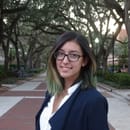For many years, I didn’t have a name for what ailed me. Everyone else, from the outside looking in, thought they knew better. Some particularly cruel classmates liked to mock me and call it anorexia. The definition didn’t fit.
According to the Body Mass Index, I wasn’t underweight; I was thin, of course, but that was already in my genes. I didn’t have a fixation on becoming thinner to the point of skipping meals and exercising relentlessly. If anything, I looked in the mirror and thought that I needed to gain a bit more weight to be healthier. My reflection showed a slender but healthy girl. I played soccer on the weekends. I ate at every meal. Every outward sign said that everything was in order, and every doctor agreed; my mind however, disagreed.
My challenge wasn’t about being thinner. It was about being in control. My parents would often worry but justify my eating habits by telling anyone that would listen (themselves included) that “she’s just a picky eater.” They tried their best in a situation they just didn’t understand.
On some level, I believe I craved control so much that my subconscious mind formed an iron-clad restraint on what I ate, and the list of options was disappointingly short. I couldn’t control where I got to spend my days or what I was allowed to explore or who was in my environment or how I felt about all of the above, but I could control what I put in my body. One day, without me realizing, it got to the point where I didn’t have control of that either.
This eating disorder was seeping into all aspects of my life. I worried about my friends or even strangers noticing that I ate little and the same at every meal. I avoided any kind of event that would involve eating in public. At home, my parents had at least grown accustomed to it, although their justifications did little to hide their worry that their daughter would wither away. I would try to change my own habits and think to myself, “How hard can it be? All I have to do is pick up a new food and take a bite.” A single bite felt like a physical nightmare. I’d find myself standing in front of the pantry, my knuckles white from how tightly I gripped the door and my body covered in a cold sweat.
The few times I could force myself to move, my arm would shake as if I was holding a thousand pounds rather than a single piece of beef. Once in a blue moon, I’d actually take a bite, and it would lead to me silently gagging, my stomach rejecting what had become a foreign invader. Disgust would bubble up inside me, and most days, I didn’t know if it was directed at the food, myself or this enemy without a name.
I wanted to fight it, but I was lost. Without a specific type of eating disorder, how was I supposed to combat it? There were times when it felt like I didn’t legitimately have an eating disorder because none of the definitions fit. It felt like my situation had to be worse for it to be valid. Eventually, I found the diagnosis called Eating Disorder Not Otherwise Specified (EDNOS). The answer is unsatisfying, but at least there is one, and at least it showed me that my situation deserved treatment just as much as any other eating disorder.
It’s only recently that I can say I have begun to see the other side of this challenge. When I came to the University of Florida, a weight lifted off my shoulders. I’d had it for so long that I didn’t know how to walk without that weight, but I had the opportunity to learn, away from prying eyes that either wanted to judge me or beg me to do better. I could try new foods and spit them out if I didn’t like them without praying that my parents wouldn’t find another failure in the trash.
Suddenly, I was entirely on my own, and I could direct every part of my life the way I wanted it to be lived. Perhaps I subconsciously realized that I had learned how to be in control in a healthy way, and therefore, I didn’t have to freeze up in a bid to protect myself when faced with the power of choice. Choice didn’t seem so frightening anymore.
I’m one of the lucky ones, as cliché as it is to say. My health wasn’t severely compromised, even during the darkest years, and I walked along the line of eating disorder instead of drowning in it. I was able to pull myself back before it became a situation where I had to save myself. Even so, I still remember wondering if I would die from this or if I would ever really live. I’m living now, and I’m learning how to be a healthy eater again. My enemy may not have a name that will satisfy me, but I’ll defeat it nevertheless.



